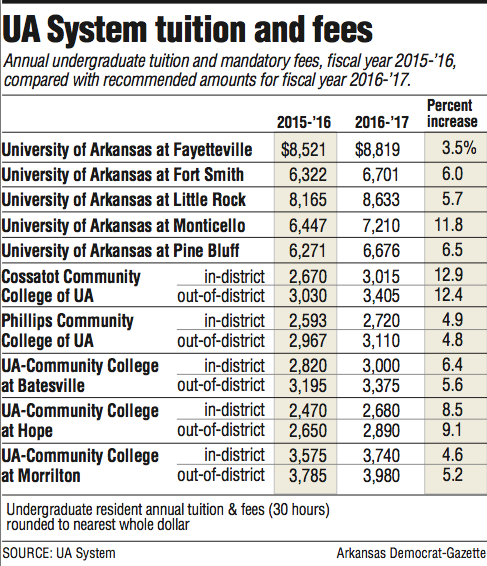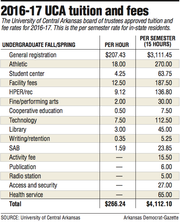The University of Arkansas System is asking its trustees for tuition and fee increases at all of its four-year universities for in-state undergraduate students.
Of the system's five community colleges, nearly all will ask the board for tuition and fee increases for in-state undergraduates. The University of Arkansas Community College at Batesville wants to keep its tuition rate the same but increase two fees.
The effort to bump up rates falls in line with what other schools across the state have done since the Arkansas Legislature left higher education state funding flat. Higher Education leaders have said their campus costs are going up and they need more revenue.
On Monday, University of Central Arkansas trustees approved a 4.25 percent increase in tuition and fees and a 4.5 percent rise in room-and-board rates for the coming fiscal year.
The tuition increase means in-state undergraduates at UCA will pay $207.43 per credit hour, up from $197.25, and graduate students will pay $255.23 per credit hour, up from $243.04.
Last week, Henderson State University and Arkansas Tech University boards gave the go-ahead for increased tuition and fee rates for their students. The Arkansas State University System board will meet June 1 to set its campuses' rates.
The UA System's board of trustees will meet Wednesday and Thursday at Cossatot Community College of the University of Arkansas' Nashville campus to set tuition and fees for its institutions, among other agenda items.
UA System schools
All but one of the UA System schools -- the University of Arkansas at Monticello -- plan a salary increase for employees.
The state ranked as the lowest among the 16-state members of the Southern Regional Education Board in 2014 in regard to average faculty salaries at public universities. Arkansas ranked second lowest -- above Louisiana -- in the board's 2014 measures for average faculty salaries at community colleges.
UA System President Donald Bobbitt thinks faculty compensation is an important systemwide problem, said spokesman Nate Hinkel.
"Recruiting and retaining top-notch faculty is getting more difficult and has a direct impact on student success and quality of education," he said.
Of all the institutions, most have budgeted for a 2 percent salary increase for their faculties and staffs. The University of Arkansas at Fort Smith is planning for a 1 percent raise, and the Batesville campus is aiming for a 1.5 percent increase.
UAM Chancellor Karla Hughes said her university has a lot of work to do to improve student success and will revisit salaries mid-year.
Of the system's universities, UAM is asking for the highest percentage increase in tuition and fees -- 11.8 percent. If the board approves that rate, an undergraduate in-state student at Monticello will pay $7,210 in tuition and mandatory fees in the 2016-17 academic year, up from $6,447.
Part of the university's request, though, is a new $10 per credit hour student success initiative fee.
"There are some strategies that we need to employ -- like building wraparound services for students and providing adequate advising resources -- to help them be successful," she said. "We're assessing our organizational structure as well as the way in which we work to communicate across the institution."
The university plans to invest in a way for it to access data about its 3,659 students so that UAM officials can spot signs of trouble earlier. Officials will also be able to predict student success based on different metrics, Hughes said.
UAM, which will bring on four new academic advisers, will also train its faculty to understand student risks, when to intervene and how to intervene, Hughes said. The university wants to add $367,460 to student success enhancements, which include providing more support during the university's welcome week.
The Monticello school plans to add a new $10 deferred maintenance fee.
At the system's flagship campus in Fayetteville, officials are seeking a 3.5 percent tuition and fee increase. If approved, the tuition and fee total at the 26,754-student campus will go from $8,521 to $8,819.40 for an in-state undergraduate student taking 30 credit hours over two semesters in the 2016-17 school year. UA-Fayetteville officials are also looking to increase out-of-state tuition by 6 percent.
The university is planning to increase its facility fee by $2 per credit hour, which will generate some $1.3 million for the campus' buildings. UA is also aiming to use $6.4 million of the additional revenue in academic related items, $1.1 million for facilities and $1 million for scholarships, according to board documents. Officials also note that health care premiums and other expenses are likely to increase by $500,000.
In the capital city, the University of Arkansas at Little Rock is seeking a 5.7 percent tuition and fee increase for in-state undergraduates. If approved, the tuition and fee total at the 11,924-student campus will go from $8,165 to $8,633 for a student taking 30 credit hours over two semesters in the 2016-17 school year.
The increase will generate $2.5 million more for the campus, with a big chunk of expenditures going toward merit salary and bonus increases, board documents show. UALR also wants to increase its athletics fee from $18.75 to $20 per credit hour. That change will add more scholarships to cover the full cost of attendance for students, board documents show.
For the system's two-year colleges, Cossatot is asking for the highest tuition and fee percentage increase at 12.9 percent for in-district students and 12.4 percent for out-of-district, students.
Overall, the 1,589-student college could see a bump in tuition and fees for in-district students taking 30 credit hours over two semesters from $2,670 to $3,015. The community college will ask the board to add two new fees: a $5 per credit hour critical maintenance fee and a $3 per credit hour enterprise fee. Most of the new revenue will go toward program support, documents show.
The school will also continue its use of open-resource materials to reduce textbooks costs for its students. Cossatot will also maintain its textbook rental program.
UA-Community College at Hope will also continue its textbook rental program, said Chancellor Chris Thomason. Hope carried out its own program last summer, renting out textbooks to its students for $20 per credit hour.
Students have been using savings from the textbook rental program to re-invest in education, Thomason said. That includes taking more courses.
The Hope school currently has the smallest gap between in-district and out-of-district tuition of all of the UA System's two-year colleges. It wants to align with the other schools and is proposing a 9.1 percent increase for out-of-district students and an 8.5 percent increase for in-district students.
The college plans to use the extra revenue for rising utility costs, student equipment, books and program-specific testing fees.
UCA
Earlier this month, UCA trustees had decided to delay action on the university's budget proposal so that they and administrators could review it further.
UCA President Tom Courtway said the school made room for the extra percent on the cost-of-living adjustment by reducing expenditures in other areas.
On Monday, the board voted to give full-time employees a 2 percent cost-of-living adjustment, 1 percentage point higher than the administration originally had asked the panel to approve. The pay increase also will now go to part-time, adjunct faculty members, Courtway said.
The revised budget now includes across-the-board $500 bonuses for employees who have been at UCA since at least Dec. 31. Savings in this fiscal year's budget allowed for the bonuses, he said.
"We've asked for things; we've given things," trustee Joe Whisenhunt said.
Courtway said the administration worked to "hold down ... the maximum cost" to students in preparing the budget for fiscal 2017, which begins July 1.
The new budget totals $182,536,464 and includes increases in some mandatory fees, such as a $1 per credit hour increase to $18 per credit hour in the athletic fee.
The new room-and-board rates include a 5 percent increase in meal plans and a 4 percent increase in room rates. Room-and-board rates will rise from $2,991 per semester to $3,124 per semester. The room increase, projected to bring in $551,000, is for maintenance and upgrades to housing.
Tuition for graduate students enrolled in a fully online program will go from $270 per credit hour to $300 per credit hour, an 11.1 percent increase.
A $200 -- or 2.6 percent -- increase in semester tuition and fees for students participating in the Global Education Project will mean rates will rise from $7,650 per semester to $7,850 per semester. Also approved was a $125 increase, or 3.9 percent, in five-week summer session tuition and fees participating in the project, from $3,225 per session to $3,350, that would take effect in the summer of 2017.
The identification-card replacement fee will rise from $10 to $15.
For undergraduate students who are registered for 30 credit hours over two years and who don't study abroad or lose their identification cards, the tuition and mandatory fees will cost $8,224.20, up from $7,888.80. Such a student will pay $335.40 more per year.
A Section on 05/24/2016


